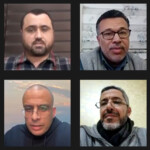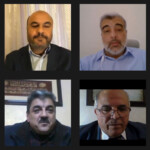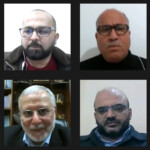Al-Zaytouna Centre for Studies and Consultations held on 16/3/2022, a panel discussion entitled, “The Impact of the Russian-Ukrainian War on the Palestine Issue. The main panelists were four experts who discussed their working papers, and dozens of researchers and experts specialized in Palestinian, Arab and international affairs participated.
Prof. Dr. Mohsen Mohammad Saleh made his opening remarks, stating that the Russian-Ukrainian war could cause international political, economic and geopolitical changes that may affect the Palestine issue.
At first, the expert on Russian affairs ‘Ali al-Baghdadi, explained the historical context and the factors that led to the outbreak of the Russian war on Ukraine, on 24/2/2022. Among the most prominent of these factors is Russia’s attempt to regain the influence it lost, after the collapse and disintegration of the Soviet Union in the early 1990s, in addition to its fears due the accession of many Eastern European countries to the North Atlantic Treaty Organization (NATO), where western countries are paving the way for Ukraine to follow suit. These conditions that developed during the Russian weakness after the fall and disintegration of the Soviet Union have become unacceptable for Russia; particularly after the military reconstruction and economic recovery phase. Such change of Russian conduct can be seen in Russia’s military intervention in Georgia in 2008, its annexation of the Crimea, its support for the separatists of Ukraine in 2014, and its military intervention in Syria to support the Syrian regime since September 2015.
As for the impact of the Russian-Ukrainian war on the Palestine issue, al-Baghdadi discussed how Israeli foreign policy dealt with this war, where confusion prevailed. Israel is trying to play a mediating role between the two sides, for several considerations, including the presence of about one million Israeli Jews of Russian descent in Israel, as well as the presence of about 600 thousand Jews living in Russia and Ukraine, not to mention that there are Israeli-Russian understandings related to the Syrian file. Furthermore, Israel has noticed the US caution and hesitancy in providing military support to the Ukrainian government, which may represent an important impetus for the formation of a regional security system that includes, in addition to Israel, the United Arab Emirates and others.
As for Israel’s exploitation of this war, al-Baghdadi said that Israel may encourage the Ukrainian Jews, who are around 150–200 thousand, to immigrate to Israel, where they would settle in settlements in the Negev region and the West Bank (WB), including occupied Jerusalem.
Hossam Shaker, the expert in European affairs, said that the war in Ukraine might result in historical transformations, both with regard to the relationship between Europe and the US, on the one hand, and between Europe and Russia, on the other hand. The European subordination to the US has been clear, especially through the military security umbrella that Washington provides to Europe through NATO, not to mention the deep-rooted US influence on the Eastern and Central Europe countries. As for the European-Russian relationship, the war proved the Europeans wrong when they betted on the integration and assimilation of Russia into the European system, which is already unacceptable by the US.
As for the impact of the war on the Palestine issue, Shaker considered the Western engagement and discourse gave a clear picture, not only concerning the double standards, but also concerning who sets them. Consequently, dealing with the resistance to the Russian occupation was completely different from the way the resistance to the Israeli occupation is dealt with; there is no talk of a refugee crisis for Europeans; there is a disregard for the high gas prices and support for dispensing with Russian gas; and there is a European desire not to open other fronts or have other crises. Shaker said that the war in Ukraine contributed, albeit temporarily, to a decline in interest in the Palestine issue, however, he added that in case Russia came out strong after this war, the increase of its influence may rebalance the international system, hence it may be a helping factor in the interest of the Palestine issue, and an opportunity that can be exploited.
Shaker called on the Palestinians to revive the Palestine issue, through qualitative action, particularly at this time when there is anger in the streets due to Israeli practices and violations, where these conditions have prompted the Israeli side to strengthen security coordination with the Palestinian Authority (PA).
Prof. Dr. Walid ‘Abd al-Hay, the renowned futures studies expert, said that he was not surprised by this war, for he predicted this path in a study he prepared in 2014. As for the impact of the war on the Palestine issue, He said that Israel is benefitting from this war by attracting Jewish immigrants from Ukraine, and is using its influence to pressure some countries not to receive Ukrainian Jews in order to push them to go to Israel. In this regard, opinion polls confirm that 65% of Ukrainian Jews prefer to go to Europe, Canada and Australia instead of going to Israel.
‘Abd al-Hay said that the immigration of Ukrainian Jews to Israel would lead to an increase in the pace of settlement building, which may increase the confrontations with the Palestinians. He said that the Israeli public supports neutrality towards the Ukrainian war, whereas the government wants to engage through mediation efforts (the presidency of the government) between the Russian and Ukrainian parties (peace diplomacy), and by having a stance against the Russian invasion of Ukraine (the Ministry of Foreign Affairs). As the war continues, neutrality becomes more difficult for American and Israeli considerations.
‘Abd al-Hay noted that the Palestinians may benefit from the Western media discussions of the Palestine issue during this war, where more than 200 articles referred to the double standards of the media in dealing with the Palestine issue compared to the war in Ukraine.
‘Abd al-Hay called for an escalation of the Palestinian resistance in WB and Gaza Strip (GS), which would pressure the Israeli side and also change the mind of Ukrainian Jews who may consider immigrating to Israel.
He noted that Israel took advantage of the war in Ukraine to deal with the Syrian file. It launched 11 military attacks on the Syrian territories during 24/2/2022–10/3/2022, whereas, before the war and in the same period of time, it launched an average of only four. He stated that the Syrian file may be affected in the future by the repercussions and results of the Ukrainian war and so will the Palestinian scene in WB and GS; particularly with the rise in oil and food prices, and the decline of European financial support to the PA.
Dr. Raid Nairat, the political science teacher at An-Najah National University, said that the continuity, development and repercussions of the war in Ukraine will determine the extent and nature of the repercussions on the Palestine issue. A number of repercussions include increasing the marginalization of the Palestine issue and the focus of the international and Arab media on the war in Ukraine. These would be added to the already happening marginalization as a result of the recent normalization agreements, the preoccupation with the COVID-19 pandemic and the imbalance of power in the Middle East, as a result of the absence of powerful states like Egypt and Syria, and the emergence of the role of the Arab Gulf states. Such imbalance may increase due to the rise of oil prices, therefore strengthening the role of the oil-producing Gulf countries, while the role of other countries would decline.
Concerning the Palestinian conditions, Nairat said that the economy in the PA territories is declining as a result of the decline of European support. As a result, paying the salaries of the PA employees faces obstacles, at a time the prices of lands in PA territories have soared (almost economic collapse), while it is difficult to raise the prices of commodities whose prices already rose globally as a result of the war. These conditions may push the PA to request financial assistance from Israel, as happened during the COVID-19 crisis, or from the Arab Gulf states.
As for the Palestinian resistance, Nairat indicated that the resistance could draw lessons from the Ukrainian war, by noticing the role of the (Turkish Bayraktar) drones in the war, at a time when the capabilities of the Ukrainian regular army declined, and the control over state institutions was lost.
Nairat explained the impact of the war on the behavior of Israel, Turkey and Iran in this region; where each country will move forward in the region according to its interests and depending on the results of the war in Ukraine. He added that as the war in Ukraine prolongs, Israel will take positions more biased towards the US, which will reflect on its relationship with Russia.
Other participants also intervened; such as Fouad Bseiso, Huda Na‘im, Ziad Bheis, Amin Hoteit, Yasir Fathi, ‘Amr Darraj, Kamel al-Hawwash, Bashar al-Shalabi, Walid Muhammad Ali, ‘Abdul Jabbar Sa‘id, Sa‘id Bsharat, ‘Umar Rahhal, Muhammad Mshainish, ‘Abdul Sattar Ragab, Yasser Ali and Khaled Kamal Haniyyah. Their main ideas include:
– Palestinians must be prepared to deal with the war results and their economic, political and strategic repercussions.
– Palestinian escalation with the Israeli occupation at this stage would pave the way for some Israeli concessions.
– The importance of a well-developed Palestinian discourse commensurate with the developments of the global events.
– The media comparisons between the Palestinian case versus the Ukrainian case must be invested to build pressure against Israel.
– Israel took advantage of the global preoccupation with the Ukrainian war to commit violations and carry out attacks against the Palestinians.
Al-Zaytouna Centre for Studies and Consultations, 18/3/2022








Leave A Comment